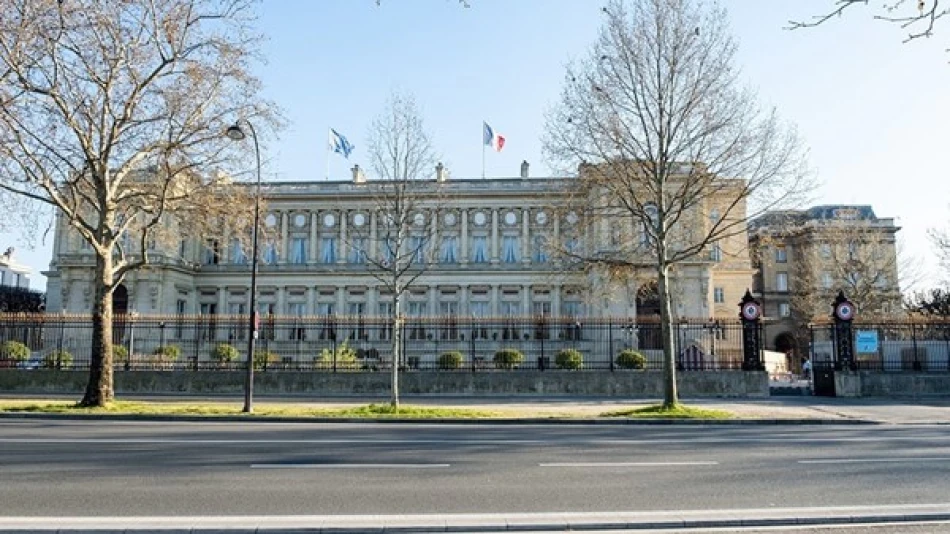
French and Syrian Foreign Ministers Meet with U.S. Envoy: Diplomatic Talks Unfold on Global Stage
France Hosts Critical Syria Talks as Regional Violence Sparks Diplomatic Reset
French Foreign Minister Jean-Noël Barrot will meet with his Syrian counterpart Asaad al-Shaibani and US Syria envoy Tom Barac in Paris on Friday, marking a significant diplomatic push following deadly sectarian violence that killed over 1,300 people in Syria's Suwayda province. The trilateral meeting signals a potential shift in Western engagement with Damascus after years of diplomatic isolation.
Timing Reveals Strategic Urgency
The Paris talks come just days after a ceasefire ended brutal clashes between local militias and tribal groups in Suwayda province that erupted on July 13. The week-long violence, which claimed more than 1,300 lives, exposed the fragility of Syria's internal security and highlighted the Assad government's limited control over peripheral regions.
This timing is no coincidence. France and the United States appear to be leveraging the crisis to re-engage with Syrian leadership, recognizing that continued instability threatens broader regional security interests.
Western Strategy Shift: From Isolation to Engagement
Breaking the Diplomatic Freeze
A French diplomatic source emphasized the "necessity of resuming a dialogue framework between Damascus and various components of the Syrian people." This language marks a notable departure from the West's previous stance of complete diplomatic isolation of the Assad regime.
The source added that "Americans and France continue to move very proactively to ensure this dialogue takes place and leads to a peaceful negotiated solution that strengthens the transition in Syria."
Pragmatic Realpolitik
This diplomatic pivot reflects a growing Western acknowledgment that Assad's government, while internationally isolated, remains the de facto authority in most of Syria. Similar pragmatic shifts have occurred elsewhere in the Middle East, where Western powers have gradually re-engaged with previously ostracized regimes when strategic interests demanded it.
Regional Context and Implications
The Suwayda Crisis as Catalyst
Suwayda province, predominantly inhabited by the Druze minority, has long been a semi-autonomous region where Damascus exercises limited direct control. The recent violence between local militias and tribal groups demonstrates how quickly localized disputes can escalate into humanitarian catastrophes in Syria's fractured landscape.
The scale of casualties—over 1,300 deaths in just one week—likely alarmed Western policymakers who recognize that such instability can create opportunities for extremist groups and generate new refugee flows toward Europe.
Broader Strategic Calculations
France's initiative aligns with broader European concerns about Syrian stability affecting migration patterns and regional security. Unlike the UAE's earlier diplomatic normalization with Syria, which focused primarily on economic opportunities, the French approach appears driven by immediate security imperatives.
What This Means for Syria's Future
Limited but Significant Opening
While this meeting doesn't signal full diplomatic normalization, it represents the highest-level Western engagement with Syrian officials in years. The inclusion of both French and American representatives suggests coordinated Western strategy rather than unilateral French action.
For Assad's government, the talks offer potential legitimacy and possibly sanctions relief discussions, though any concrete outcomes will likely depend on Syrian willingness to engage in meaningful internal dialogue with opposition groups.
Testing Ground for Diplomatic Solutions
The Paris meeting will likely serve as a testing ground for whether diplomatic engagement can produce tangible results in addressing Syria's internal conflicts. Success could pave the way for broader Western re-engagement, while failure might reinforce arguments for continued isolation.
The focus on "peaceful negotiated solutions" and "transition" suggests Western powers haven't abandoned their long-term goals for Syrian political reform, but are now pursuing them through engagement rather than isolation.
Most Viewed News

 Layla Al Mansoori
Layla Al Mansoori






